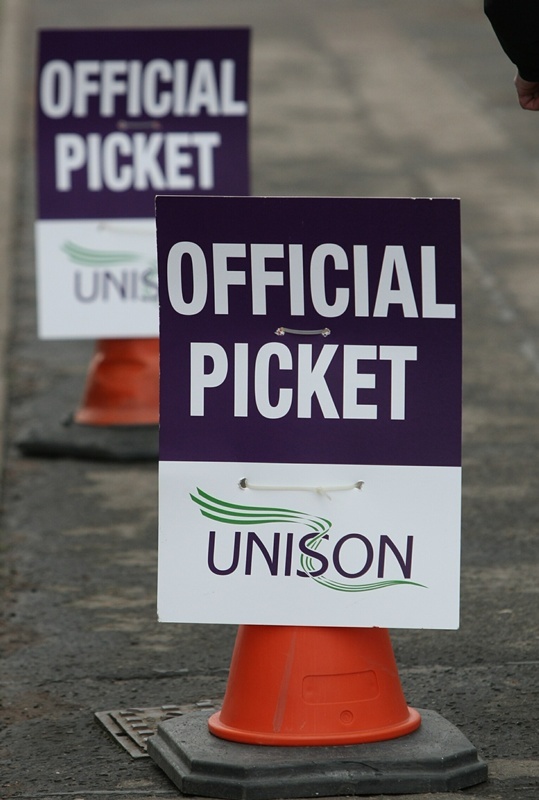Tens of thousands of public sector workers across Tayside and Fife joined Wednesday’s national strike.
The protest over proposed changes to pensions closed schools and many council services, forced the cancellation of hospital operations, left bins unemptied and caused disruption to public transport.
Prime Minister David Cameron called the UK-wide action a ”damp squib”. It did not seem that way in Dundee City Square where several thousand people gathered for a rally and heard the Rev Erik Cramb, speaking for Dundee Pensioners’ Forum, mock Mr Cameron’s Big Society by telling the strikers: ”We are all in it together”.
It is thought around 300,000 workers across Scotland walked out. With around two million taking part across the UK, it was the biggest strike seen for decades.
Public sector unions were protesting over plans to make their members pay more into the pensions and retire later.
David Watson, Unison organiser for Scotland, said ”just about everyone” had been affected by the action.
Only around 30 of Scotland’s 2700 schools were open, forcing many parents to take the day off work or arrange alternative childcare.
The closures affected Dundee, Fife and Perth and Kinross, but parents in Angus had extra warning as it was a scheduled holiday.
Ronnie Smith, general secretary of the Educational Institute of Scotland (EIS), said: ”There has been excellent support for the action right across the country as teachers and lecturers make a stand against the Government’s damaging and unjustified raid on public sector pensions.”
Thousands of patients across Scotland had hospital appointments and operations cancelled or postponed as around 50,000 healthcare staff took part in the strike. Urgent operations went ahead and emergency services continued to work as normal.
NHS Tayside had to cancel around 800 routine procedures, although it said its contingency plans had worked well and there had been no reports of major problems in the region, with all wards and inpatient services staffed appropriately.
Outpatient clinics were also running as planned and community nurses were visiting patients.For in-depth area-by-area coverage and analysis of the strike, see Thursday’s CourierIn Dundee, the city council was badly affected, although discussions with trade unions meant enough staff were on duty to run essential services at a reduced level.
Council staff in Angus were given the day off for St Andrew’s Day, which disarmed much of the strike’s impact.
Arrested criminals were moved overnight to police HQ in Dundee as the Arbroath custody suite was closed.
Refuse collection came to a halt and the local authority’s skips were closed.
The strike saw picket lines set up in Perth and Kinross, with workers at the Scottish Natural Heritage HQ in Battleby striking for the first time.
Alan Denney, spokesman for the Prospect union, said: ”Most of them have never been on strike before, but they feel what the Westminster government is doing is both deeply damaging and unfair.”
Students at Perth College joined staff in solidarity over the pension protest and over cuts in further education and many council services were affected, with community centres and most libraries closed.
Council committee meetings went ahead, but without Labour councillors, who mirrored the action of the party’s MSPs in refusing to take part in a debate on pension reforms at the Scottish Parliament.
Picket lines could also be seen in Fife, with the strike causing disruption similar to that experienced in other parts of Courier country.
Patients had to put up with cancelled hospital appointments, parents had to cope with closed schools.
One parent who had to deal with both situations was Marion Watson from Kirkcaldy.
The expectant mum will have to wait a week for a hospital test, and also had to look after her three children as their school was shut.
”It’s been difficult, especially with the weather like it is at the moment you can’t really go out to many places to keep the kids occupied,” she said.
Ministry of Defence civil servants at RAF Leuchars also joined the strike, which saw picketing at the Scottish Parliament and mass rallies being held in several cities.
The SNP refused to clear the parliamentary timetable, saying MSPs should be debating the issues which led to the industrial action.
A Scottish Government spokesman confirmed ministers did not support the strike action.
A spokesman for the Convention of Scottish Local Authorities said councils had put their resources into protecting services for vulnerable people.
